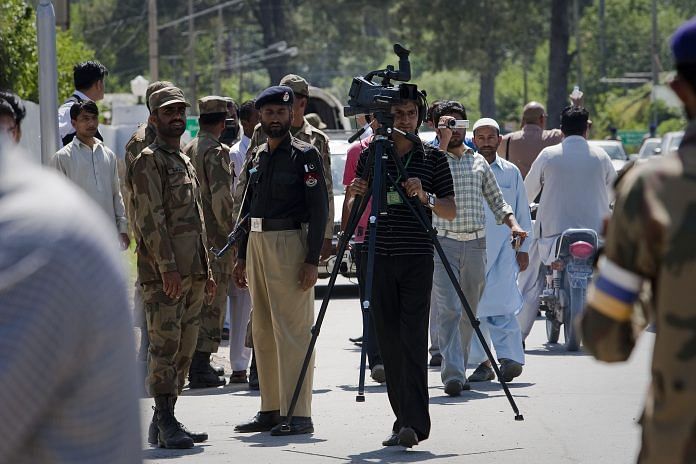Unlike China, where press regulation is a state affair, Pakistan’s self-censorship emerges from something far more insidious – fear.
New Delhi: As the stranglehold of Pakistan’s judiciary and military increases over state institutions, the country’s free press is apparently being systematically silenced through intimidation and coercion.
On 8 April, tens of thousands of protestors gathered in the northern city of Peshawar in support of a growing civil rights movement that condemned the merciless killings and ‘disappearances’ of members of the minority Pashtun community allegedly at the hands of the Pakistani military.
Despite staggering numbers and the willingness of young leaders to publicly decry military oppression, the largest political movement in Pakistan since 2007 received next to nil media coverage – local TV channels barely touched the topic, and less than a handful of newspapers carried reports.
On the following Sunday, three articles published by The News International, one of Pakistan’s largest English news organisations, were taken down.
Insiders say that unlike in China, where press regulation is a state affair, Pakistan’s self-censorship emerges from something far more insidious – fear.
The cautionary tale of Geo TV
Earlier this month, Pakistan’s largest television network was forced off air in over 80 per cent of the country, as cable operators began to block the airing rights of Geo TV. What began as the revoking of airing privileges in cantonment areas and defence housing authority neighbourhoods soon spread to all parts of the country.
In a statement, Steven Butler, the Asia programme coordinator of the Committee to Protect Journalists, said: “The arbitrary suspension of Geo TV on cable is a direct assault on Pakistan’s constitutionally guaranteed right to access information.”
According to a report in the New York Times, the TV channel had found itself on the wrong side of the Pakistani military after its particularly critical coverage of Islamabad being added to the Financial Action Task Force’s terror financing watch list.
The blackout of Geo TV was also left out of prime time coverage by other networks.
Pakistan’s official media regulating body, the Pakistan Electronic Media Regulatory Authority (PEMRA) claimed through a press release that it was not behind the clampdown, and issued a direct order for the restoration of the channel.
Speaking on the Geo News programme ‘Naya Pakistan’, interior minister Ahsan Iqbal said: “If these things are not corrected, then questions will be raised on the transparency of the upcoming elections.”
‘Mysterious circumstances’
A series of scattered missing persons reports and unsolved abductions over the years have instilled a suspicion among critics of the state that Pakistan will not tolerate dissent at any cost.
In January 2017, poet, social activist and academic Salman Haider was abducted while travelling back home on the Islamabad highway. As news of his abduction reached mainstream media channels, the families of two bloggers — Aasim Saeed and Ahmed Waqas Goraya — also stepped forward with reports that they had been missing since early January.
In the days that followed, activists Ahmed Raza Naseer and Samar Abbas also couldn’t be found by their loved ones. While four of them returned home after weeks of speculation and protests, the mysterious and unexplained disappearances of five liberal activists who campaigned for human rights and religious freedom was seen as an unmistakable warning sign from the deep state.
In his first press conference, director general of the military’s Inter Services Public Relations, Major General Asif Ghafoor, denied the army’s involvement.
Judicial overreach
As ThePrint reported, being in Chief Justice of Pakistan Saqib Nisar’s bad books can also prove to be extremely detrimental. Less than a week ago, Nisar banned Nawaz Sharif from holding office for life on the basis of corruption charges. Prior to this, the judiciary had removed him from the office of prime minister, and also denied him permission to continue as his party’s president.
Furthermore, on 16 April, the Lahore High Court ordered PEMRA to stop all TV channels from airing what they termed were “anti-judiciary speeches” by Sharif. The court asked PEMRA “to strictly monitor TV channels with regard to airing any anti-judiciary speeches/remarks and submit a report after 15 days,” a court official was quoted as saying by the Press Trust of India.
The fall of the democratic process
On the same day, representatives of civil society and the media issued a joint statement expressing their concerns about the state’s active suppression of free speech, dissent, and people’s movements.
With Pakistan’s general elections slotted for this year, journalist and author Zahid Hussain wrote in the Dawn: “Any move to crack down on the media for whatever reason on the eve of a general election that promises to lead to a historic second transition from one elected government to another raises questions about the fairness of the polls.”
He isn’t the only one questioning the recent upsurge in media censorship. The joint statement also calls “upon all parliamentary forces, civil society organisations and media bodies to thwart the authoritarian designs against truly representative system and sovereignty of the people.”



